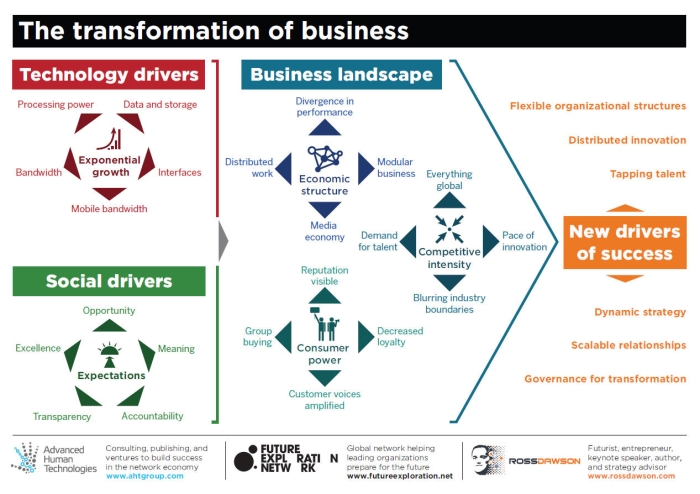There are 3 social media trends that you need to be aware of to guide your strategy:


- The more content that flows through each network the more niche you need to be to attract your audience
- Social brands are becoming personal in order to win customers, engage employees and innovate
- Customer engagement is a priority but without communities it is just social media broadcasting
I recently read these blogs that made me question what it is that demonstrated some of these trends:
- Why chasing Facebook likes is not clever social media marketing by Jeff Bullas
- Social Business By Design: A Year of Lessons Learned – By Dion Hinclifee
- The New Face Of Content Marketing – Mitch Joel
- Here’s Why We Stopped Wasting Time on Facebook – Jeff Gibbard on Social Media Today
1The Content Problem


Every body is on the content band wagon. Businesses daunted by the prospect of social media are nowing having to recognise that search marketing is converging with social and this needs to fueled by a healthy flow of quality content.
Resource stretched, time constrained and uncertain of what to do? Well as the content wave/noise rises focus becomes more important than ever. You can’t fight on two many fronts unless you have endless hours or budgets.
- As the content wave rises you need to make sure you are addressing the specific needs of your target customers:
- how you can you make it easier for them to buy your product/services – a checklist to help you choose which laptop to buy
- What content can add value to them – 20 ways to avoid stress at work and live longer
- What problems are they facing e.g. how to get more out your savings
- Treating every customer the same doesn’t work – use Marketing Personas to define different behaviours and needs of customers
- Narrow down your marketing to focus on niche markets/market segments – be a specialist
- Limit the channels you use – no more than 2 regularly and focus – you will get better results this way
A key part of any business is understanding who and what customers to keep and which to lose. I helped a client hand over to another smaller company (in exchange for a budget) 20% of their customers because they cost too much to serve and were not profitable. The remaining clients got more attention and wihin 6 months the business had more business (cross selling and up selling other products to them – helping them grow).

The key here is to recognise that analysing customers financially is vital. Simply plotting turnover and profit can be a good start point.

The key here is to recognise that analysing customers financially is vital. Simply plotting turnover and profit can be a good start point.
Another approach is to recognize that budgets need to change. Aligning your budget to digital marketing – content, social and SEO is a vital part of moving forward.
Personally I not for tripling down on content – I think focus and quality will win.
2The Move To Becoming Bold and Personal
The days of starchy business figures directing from behind the scenes is over. Those businesses that put leaders and personalities at the frot of the business win – hands down. But according to a Ketchum report social leaders are failing.
The days of starchy business figures directing from behind the scenes is over. Those businesses that put leaders and personalities at the frot of the business win – hands down. But according to a Ketchum report social leaders are failing.
Here is a scenario:
Two candidates are in an interview. They are both equally skilled at there job, both have same level of qualifications, both good personalities. But one has got a very high following on social media – far greater than your business could ever hope for. More to the point the following are your target audience. The other has no social brand/presence. Who are you going to hire?
Two candidates are in an interview. They are both equally skilled at there job, both have same level of qualifications, both good personalities. But one has got a very high following on social media – far greater than your business could ever hope for. More to the point the following are your target audience. The other has no social brand/presence. Who are you going to hire?
As personal brands and business brands merge this is something that will happen in real life – take Altimeter who last year recruited Brian Solis (author, speaker, thought leader and key influencer). Putting people at the front of your business matters and as Dion Hinchcliffe highlights it is the first step towards becoming a social business.
- As the demand of social, content and SEO increases trying to manage much by a few becomes harder
- Businesses need to open up and harness the power of their employees to be part of this change
- With team play comes more ideas, bolder marketing and more confident support for each person
- Policies and procedures then help to maintain service levels, develop effective workflows and protect brand reputation
3Communities Trump
So count in your Twitter stream, Facebook stream or other how many social media broadcasts you have seen. Brands and businesses, often irrelevant, in your stream. In fact a recent report showed that we are even blanking these out now.
So count in your Twitter stream, Facebook stream or other how many social media broadcasts you have seen. Brands and businesses, often irrelevant, in your stream. In fact a recent report showed that we are even blanking these out now.
I am a big fan of Ross Dawson, futurist, strategist and author. One of the biggest parts of social media is the collaborative nature of it, the harnessing of people’s genuine interests and passions. When we look at reports like the IBM State Of Marketing Report we can see that customer engagement remains a challenge!
Marketers are failing to identify the purpose of the business in connection with the customer. This goes beyond the obvious question of why would a customer really want to like my Facebook page. This is about how can we help customers connect with each other and what is our role in facilitating this.
Communities are not just email lists. Communities are social environments where people can interact freely with each other. The role of the brand then is not to interrupt conversations but to facilitate them.
It is for this reason that I think Facebook faces its greatest challenge. Whilst groups exist they are not visual, easy to manage and hard to scale. Facebook has decided to not let brands reach their audience unless they pay for it e.g. your Facebook page post will only get to around 16% otherwise.
Google Plus though makes its money through search marketing. Google Plus becomes a data centre where potentially ads do not have to exist. Google Plus has built into it communities that are visual, engaging and thriving around interests. Communities can managed in many different ways on your own social network e.g. BuddyPress (for SMB’s), Jive (SME) or simply use platforms like Google Plus.
I believe that leading businesses will return again to communities as the content tide rises, focusing on the relationships and in Ross Dawsons example distributed talent networks.

Businesses that demonstrate open social leadership, focus on niche marketing, harness their people and foster communities will succeed. These are the underpinning strategies for success using social media.